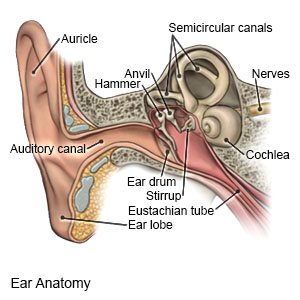Hearing Loss in Children
Medically reviewed by Drugs.com. Last updated on Aug 4, 2025.
Hearing loss means your child has trouble hearing or he or she cannot hear at all in one or both ears. Hearing loss can happen suddenly or slowly over time.
DISCHARGE INSTRUCTIONS:
Call your child's doctor or audiologist if:
- Your child has fluid, pus, or blood leaking from his or her ear.
- Your child has sudden, severe hearing loss.
- Your child has a fever.
- Your child has ear pain that is getting worse.
- Your child has ringing in his or her ears or dizziness that will not go away.
- You have questions or concerns about your child's condition or care.
Types of hearing loss:
- Conductive hearing loss occurs when there is a problem with your child's outer or middle ear. Sound waves cannot reach his or her inner ear. This type of hearing loss may be caused by earwax buildup, fluid, or a punctured ear drum. It can often be treated by correcting the cause of the problem.
- Sensorineural hearing loss is caused by damage to parts of the inner ear. Sensorineural hearing loss usually cannot be cured.
- Mixed hearing loss includes both conductive and sensorineural hearing loss.
- Central auditory processing hearing loss means your child's brain has trouble processing sounds correctly.
 |
Help manage your child's hearing loss:
- Keep your child away from loud noises to help prevent more hearing loss. This includes fireworks, loud music, motorcycles, and power tools.
- Face your child when you speak to him or her. When you are in a group setting, have your child sit where he or she can clearly see the faces of the people who are speaking. Ask people not to speak loudly or shout when they speak to your child. People should speak using their usual tone and volume.
- Learn about assistive listening devices (ALDs). ALDs pick up sound and send it through earphones or a headset. ALDs can help your child hear better when he or she is in a place with background noise. Examples include classrooms, theaters, or auditoriums. ALDs can be used alone or with hearing aids or cochlear implants.
- If your child has hearing aids, he or she should wear them regularly. Talk to your child's healthcare provider if your child is having trouble with his or her hearing aid.
- Ask about cochlear implants. If hearing aids do not help your child, talk to his or her healthcare provider. Cochlear implants may help him or her hear better. A cochlear implant is a tiny device that is put into your child's cochlea (part of the inner ear) during surgery. This device can only be used for sensorineural hearing loss.
Follow up with your child's doctor or audiologist as directed:
Write down your questions so you remember to ask them during your visits.
© Copyright Merative 2025 Information is for End User's use only and may not be sold, redistributed or otherwise used for commercial purposes.
The above information is an educational aid only. It is not intended as medical advice for individual conditions or treatments. Talk to your doctor, nurse or pharmacist before following any medical regimen to see if it is safe and effective for you.
Learn more about Hearing Loss
Treatment options
Care guides
Further information
Always consult your healthcare provider to ensure the information displayed on this page applies to your personal circumstances.
